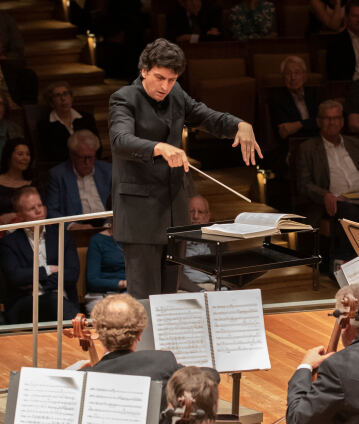Michael Sanderling y Bruno Delepelaire

El Segundo Concierto para violonchelo de Haydn es el más importante de los escritos en el Clasicismo vienés. Impresiona por una parte solista cálida, cantable, que alterna con gran emotividad entre la melancolía y un humor más desenfadado. Lo tocará Bruno Delepelaire, primer solista de violonchelo de los Berliner Philharmoniker. En el que será su debut con la orquesta, Michael Sanderling dirigirá la Sinfonía Leningrado de Shostakóvich: una visión brutal y como de pesadilla de la Segunda Guerra Mundial.
“I remember very well my first concert with the Berliner Philharmoniker. At that time, I was a student at the Karajan Academy, and we played Beethoven’s Third Symphony under Bernard Haitink. The energy emanating from the orchestra was incredible. I was immediately carried away by this energy. It was a dream! I am very grateful for my time in the Karajan Academy. I learned right from the start to adapt to the special sound of the Philharmoniker.” The fact that Bruno Delepelaire wanted to become a cellist was determined early: his grandmother was a keen amateur cellist, and as a five-year-old, he wanted to learn the instrument, too. Since 2013, the musician has been 1st principal cellist with the Berliner Philharmoniker; in these concerts, however, he will be not part of, but in front of the orchestra as the soloist in Joseph Haydn’s Second Cello Concerto.
Haydn’s concerto was still attributed to the cellist Anton Kraft in Gustav Schilling’s 1837 Encyclopaedia der gesammten musikalischen Wissenschaften, but he turned out not to be the author but the dedicatee. Kraft was then a first cello in the orchestra of Prince Esterházy and was later regarded as one of the greatest virtuosos in Vienna. As a result, Haydn was able to create a spectacular concerto, with intricate playing in high positions, tricky semiquaver triplets and rushing demisemiquaver passages. The conductor is Michael Sanderling, who himself was a solo cellist for many years. In these concerts, he makes his debut at the helm of the Philharmoniker.
The programme continues after the interval with Dmitri Shostakovich’s Seventh Symphony. It was created in the immediate vicinity of the fighting in and around Leningrad, when the city was encircled by German troops on 30 August 1941 and besieged for two and a half years during the Second World War: “To this day,” said Shostakovich looking back, “I know all the dates: I finished the first movement on 3 September, the second on the seventeenth, and the third on the nineteenth. I worked day and night. Sometimes bombs were falling all around and the air defence came into action. But I did not interrupt my work for a moment.” Talking about the so-called “invasion” theme of the first movement in which a subject accompanied by small drums increases in ever greater brutality in the course of twelve repetitions, Shostakovich remarked, “critics with nothing better to do will damn me for copying Ravel’s Bolero. Well, let them. That is how I hear war”.
© 2019 Berlin Phil Media GmbH
Entrevistas del concierto